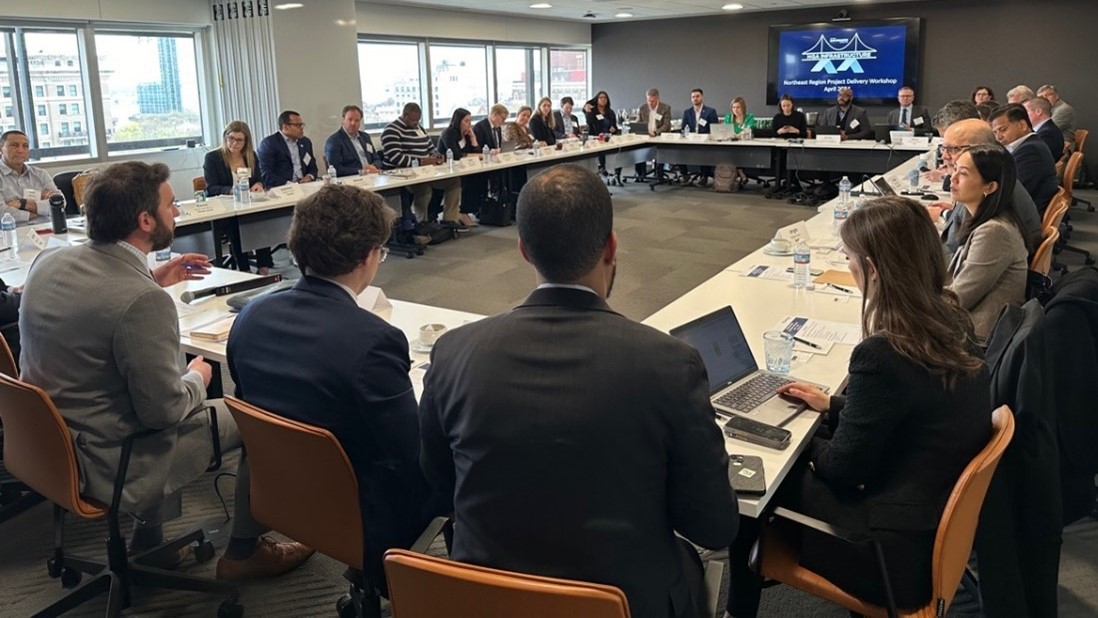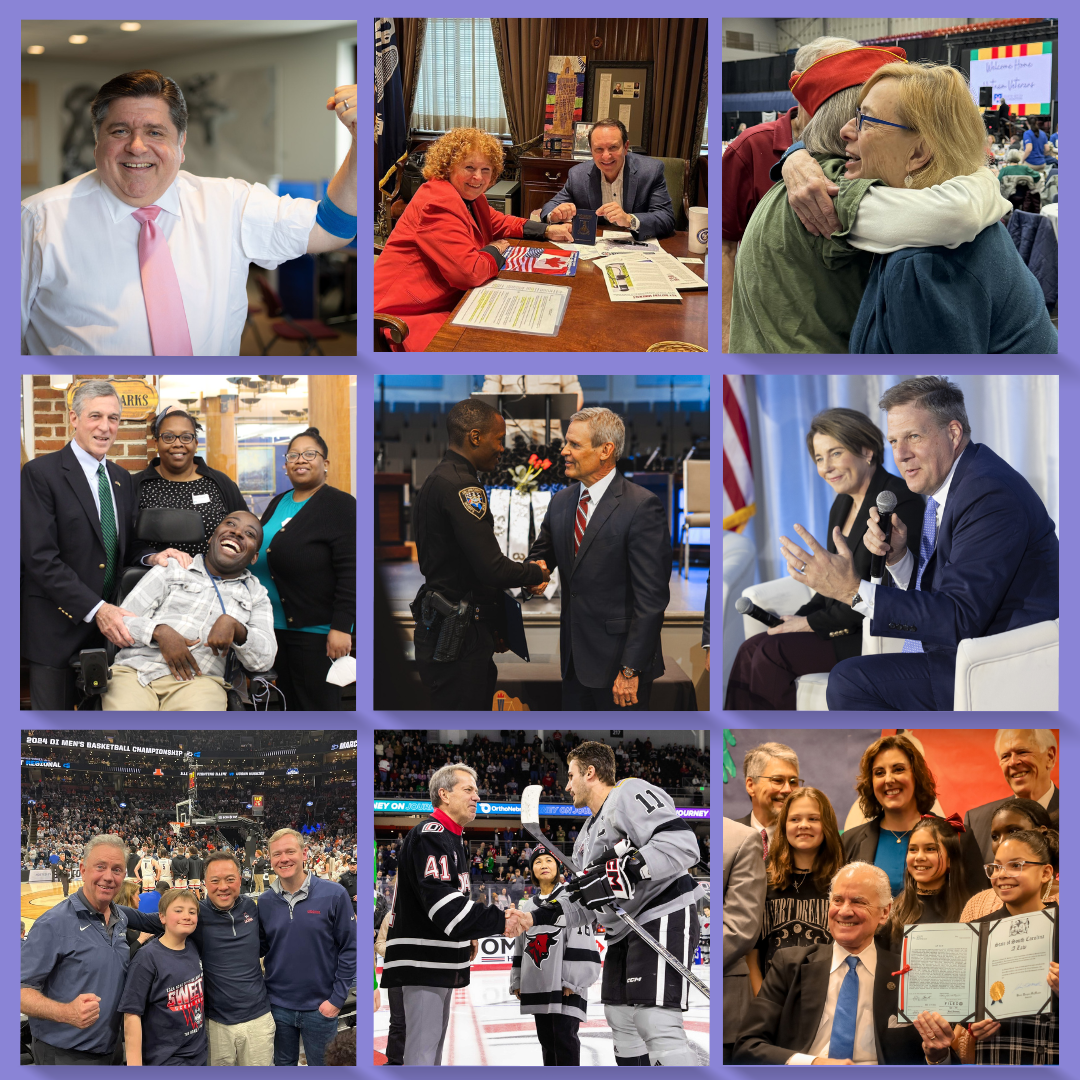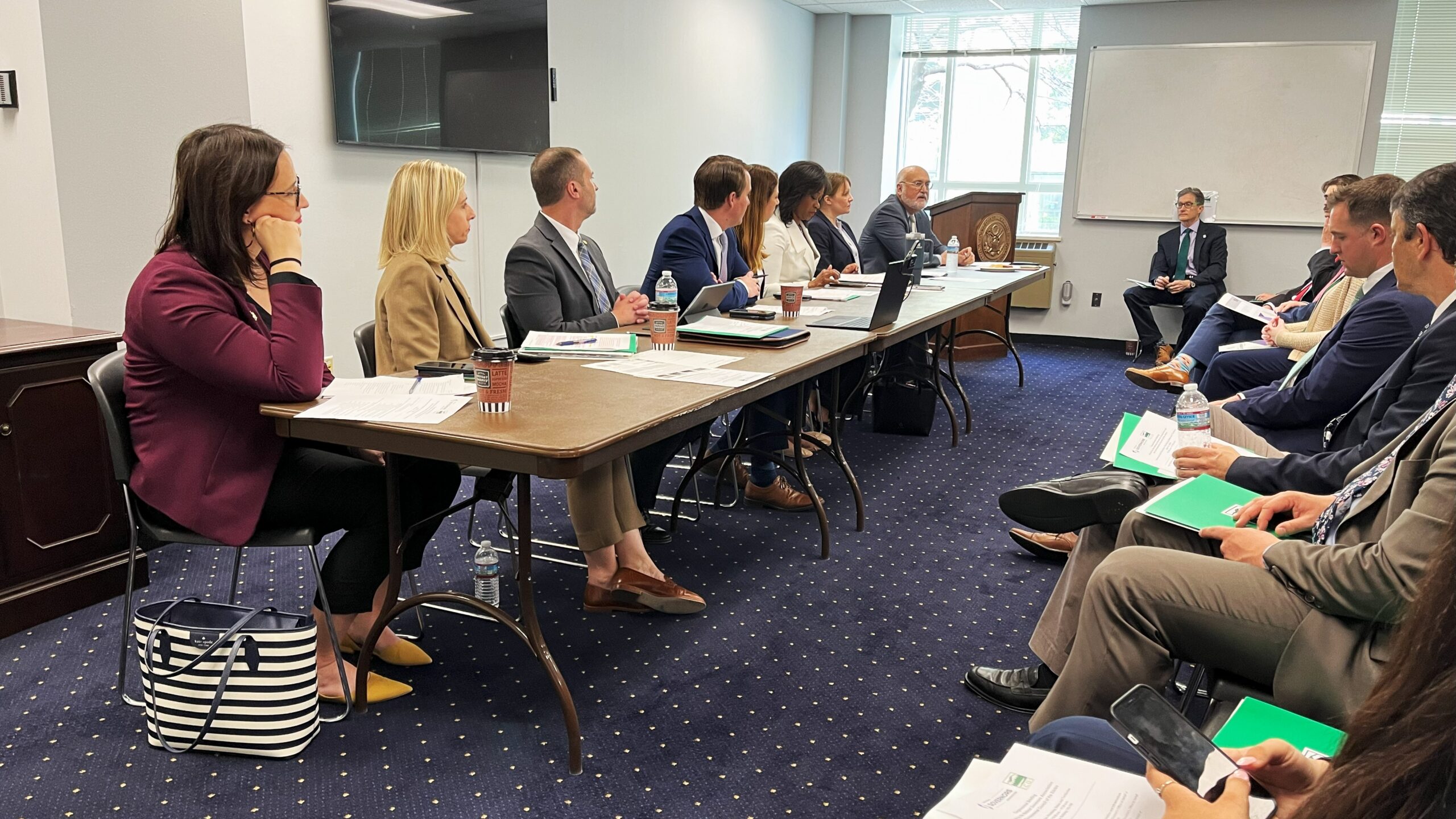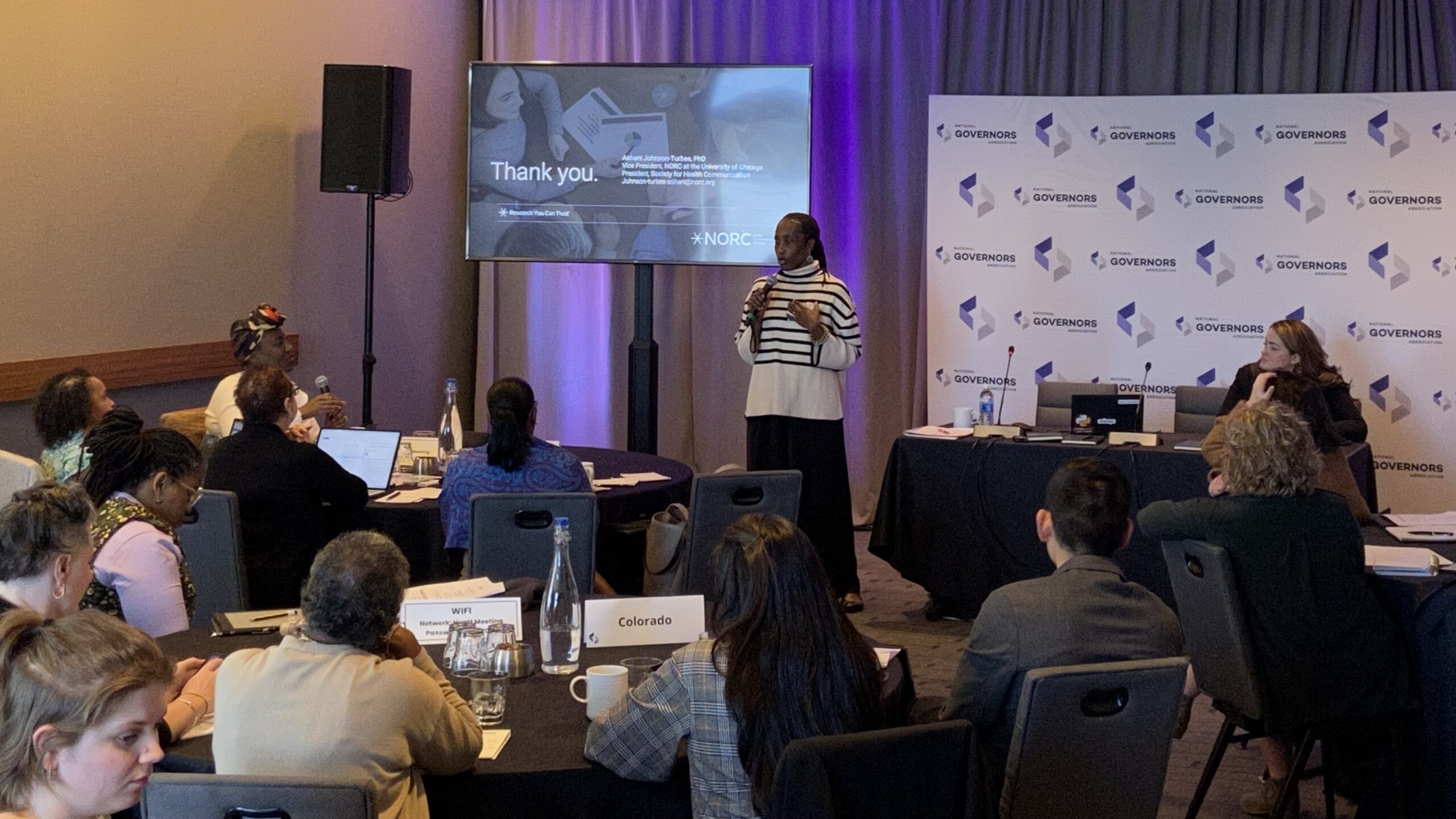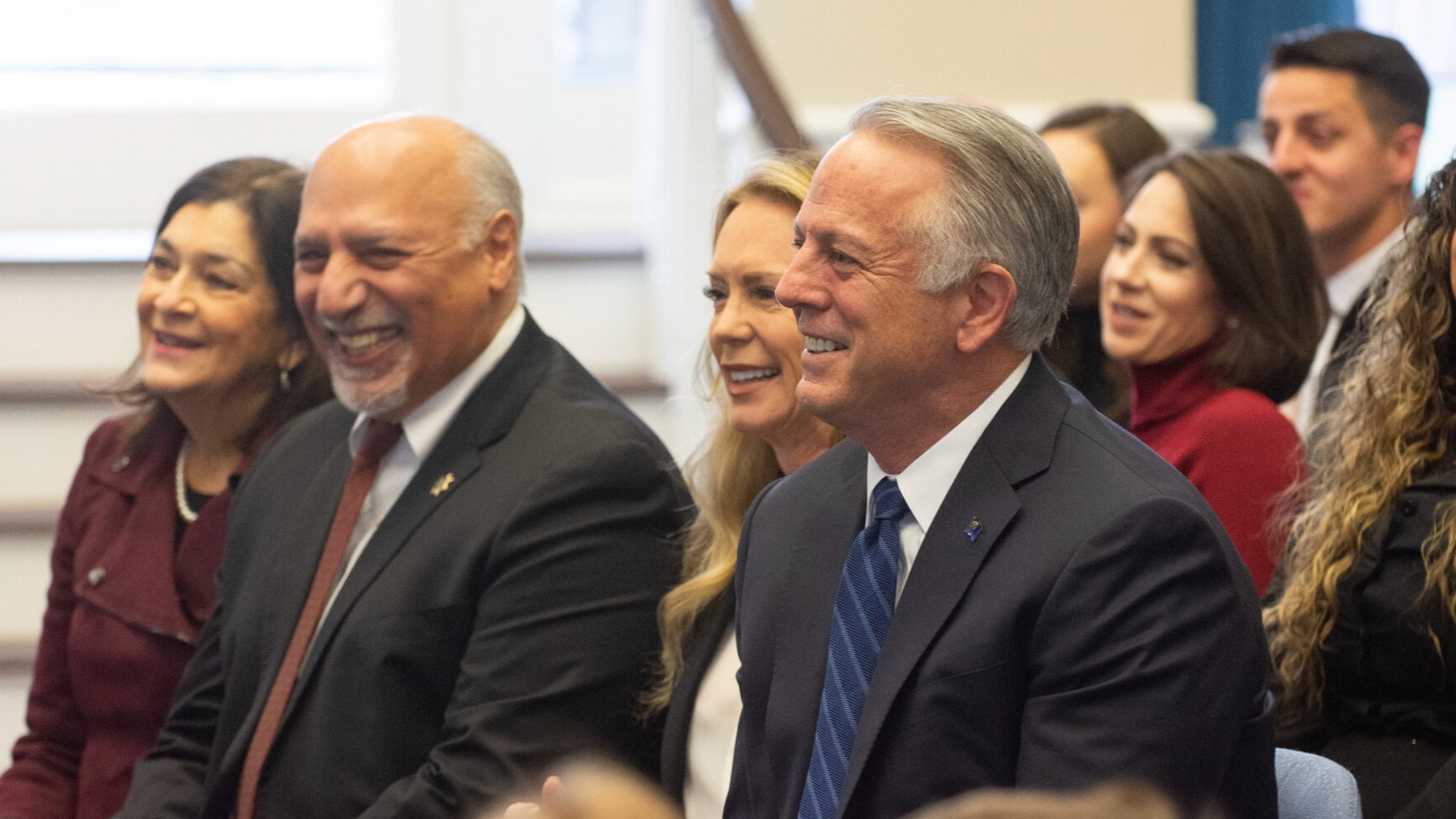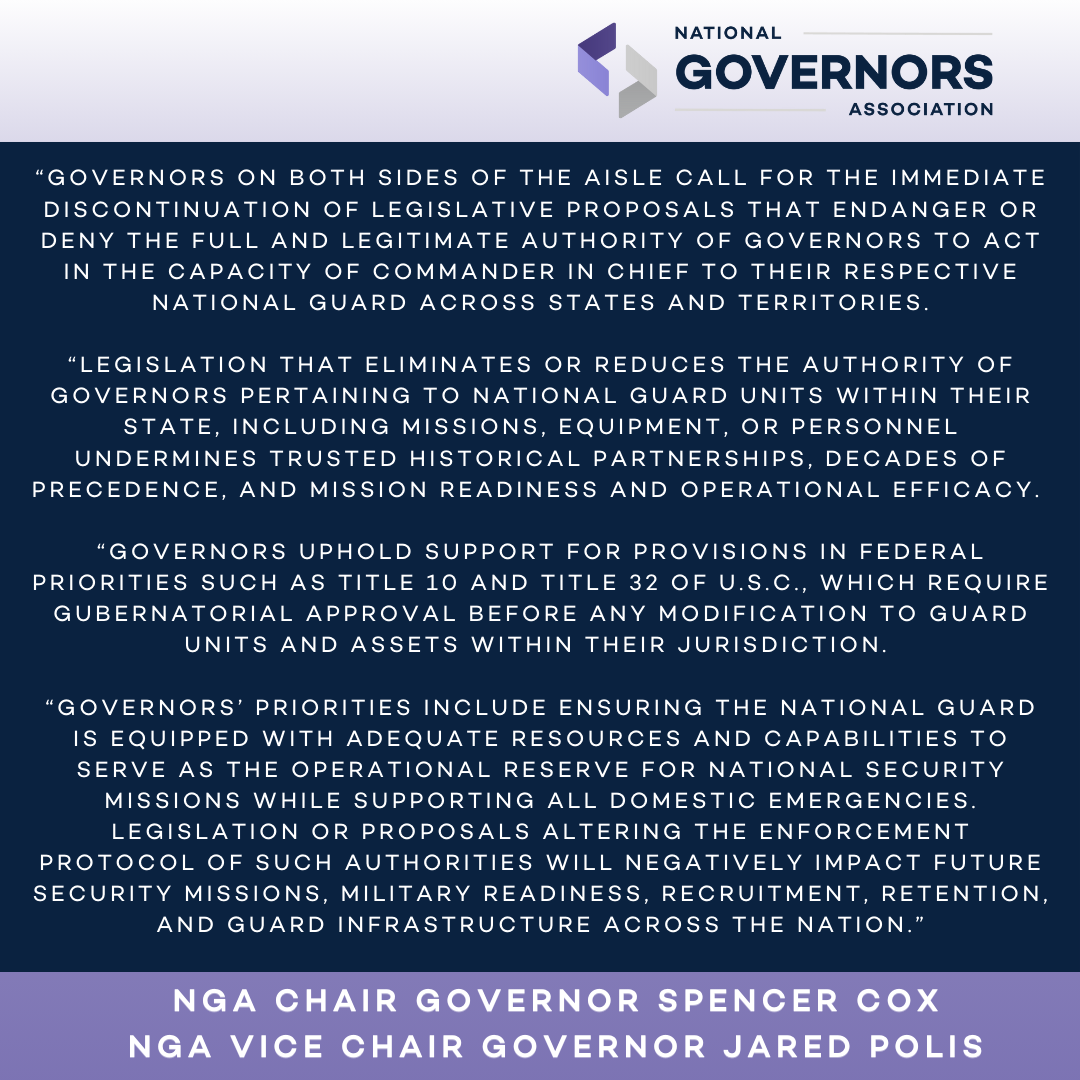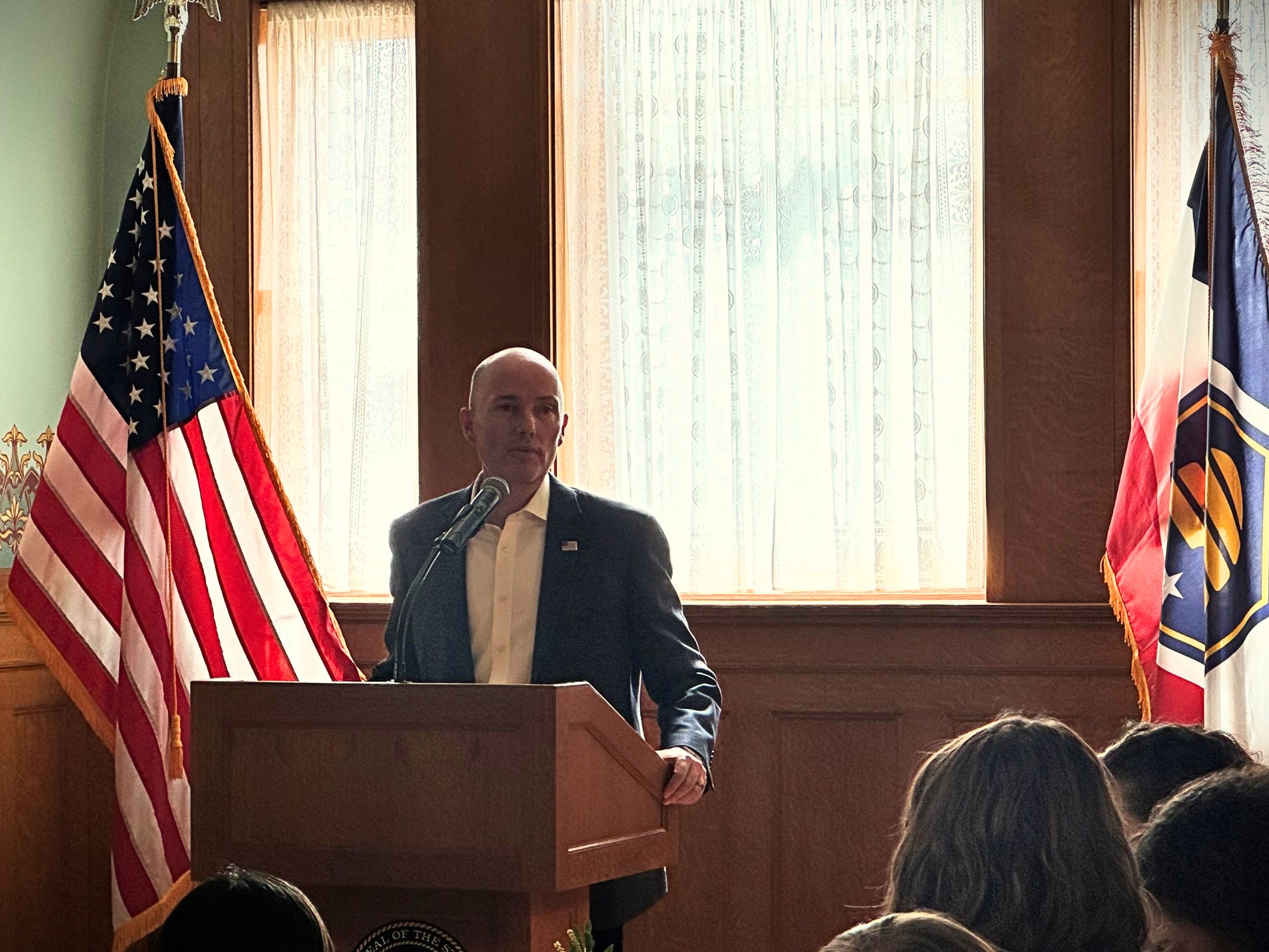The National Governors Association, NGA, and five other groups hosted the 21st annual Intergovernmental Meeting with the U.S. Department of Energy on Nuclear Weapons Waste Cleanup from November 30 – December 1, 2022, in New Orleans, Louisiana.
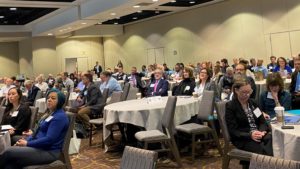
This annual meeting convenes state, local, tribal, and federal officials to discuss priorities and strategies for managing and storing defense nuclear waste and for remediation of production sites. It is convened by the U.S. Department of Energy Office of Environmental Management (DOE-EM) and the six intergovernmental groups partnering in, and affected by, the ongoing cleanup of defense-related nuclear waste. The six groups are:
- Energy Communities Alliance (ECA)
- Environmental Council of States (ECOS)
- National Association of Attorneys General (NAAG)
- National Conference of State Legislatures Nuclear Legislative Working Group (NCSL NLWG)
- National Governors Association Federal Facilities Task Force (NGA FFTF)
- State and Tribal Government Working Group (STGWG)
Meeting attendees listened to presentations and interacted with expert speakers and officials from the Department of Energy, Environmental Protection Agency, the National Park Service and the Department of Defense during sessions on waste disposal, workforce training, environmental justice, protection of historic landscapes, emerging contaminants, and climate change. To gain a deeper understanding of the DOE-EM budget process and the best strategies for providing input, attendees participated in a simulation of the DOE-EM budget development process, followed by a discussion of the DOE-EM budget and best practices for interacting with DOE-EM sites.
Agenda/Presentations
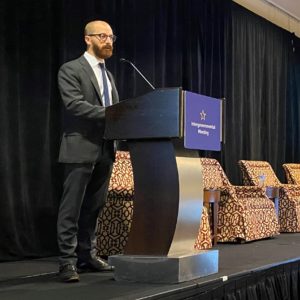
Wednesday, November 30, 2022
WELCOME AND TRIBAL INVOCATION
Representatives of the intergovernmental groups and the U.S. Department of Energy will welcome participants to the meeting.
Speakers:
- Dan Lauf, Energy Program Director, National Governors Association Center for Best Practices (NGA Center)
- Joceline Nahigian, Director, Office of Environmental Management Intergovernmental & Stakeholder Programs, U.S. Department of Energy
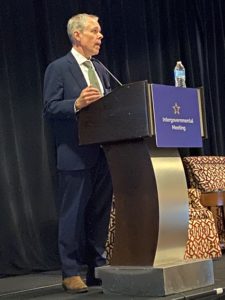
PROGRAM UPDATE AND ENVIRONMENTAL MANAGEMENT PRIORITIES AT THE U.S. DEPARTMENT OF ENERGY
Introduction: Brent Gerry, Mayor/CEO, West Richland, Washington and Chair, Energy Communities Alliance
Speaker: William “Ike” White, Senior Advisor for Environmental Management to the Under Secretary of Science, U.S. Department of Energy
HEARD ON THE HILL
A look at how recent state and federal elections may impact the nuclear weapons waste cleanup efforts.
Speaker: Seth Kirshenberg, Executive Director, Energy Communities Alliance (Presentation Slides)
GETTING TO DISPOSAL: NAVIGATING THE FUTURE OF WASTE MANAGEMENT
Over the past several years, DOE-EM and their cleanup partners have made significant progress managing and disposing of waste across the complex. However, some of the most challenging work still lies ahead: the need for additional onsite disposal cells, addressing new low-level waste inventories, identifying disposition paths for orphan waste streams, and developing alternatives to address legacy defense high-level waste in the absence of a repository program.
Alongside state, local and tribal community representatives, DOE-EM will address their priorities for the next year, near and long-term challenges, and opportunities for engagement with intergovernmental groups on the path forward.
Speakers:
- John Arthur “Jay” Mullis II, Acting Associate Principal Deputy Assistant Secretary, Office of Environmental Management, U.S. Department of Energy
- Cathrynn Brown, State Representative, New Mexico
- Richard Arnold, Spokesperson, Consolidated Group of Tribes and Organizations; Pahrump Paiute Tribe
- Kelly Wood, Managing Assistant Attorney General, Washington State Office of the Attorney General
Moderator: Amy Fitzgerald, Government Affairs and Information Services Director, City of Oak Ridge, Tennessee
CONSENT-BASED SITING
The consent-based siting approach, recommended by the 2012 Blue Ribbon Commission on America’s Nuclear Future, makes communities and people central to decision-making and provides funding for them to explore the benefits, risks and conditions required to host an interim nuclear waste storage site. Natalia Saraeva, the team lead for consent-based siting at DOE’s office of Nuclear Energy, will discuss how they are developing an equitable consent-based siting process for interim storage of commercial Spent Nuclear Fuel, funding interested communities, and the timeline for decision making. She will also discuss how the current process may inform future efforts to identify a permanent repository for defense-related high-level waste.
Speaker: Natalia Saraeva, Team Lead, Consent-Based Siting, Office of Integrated Waste Management, Office of Nuclear Energy, U.S. Department of Energy
Moderator: J. Peter Murrey, Senior Assistant Attorney General, Environment Division, Office of Tennessee Attorney General
PROTECTION OF CULTURAL AND HISTORIC LANDSCAPES AT DOE SITES
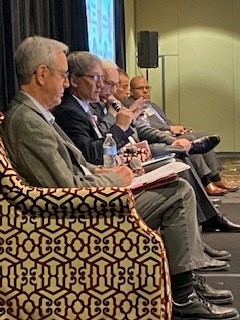
Since time immemorial, Native American tribes have had cultural connections to the land where DOE sites are located. Local communities also have historical ties, such as through the Manhattan Project. This session will examine the significance of cultural landscapes and considerations for cleanup decision-making. This session will also share how Tribes, communities and DOE are working collaboratively to create a new future while honoring past and living histories.
Speakers:
- Paul Lusignan, Senior Historian, National Register of Historic Places, National Park Service (Presentation Slides)
- Josh Silverman, Feder Preservation Officer & Director, Office of Environmental Protection and ES&H Reporting, U.S. Department of Energy (Presentation Slides)
- Lieutenant Governor James Naranjo, Santa Clara Pueblo
- David Reeploeg, Vice President for Federal Programs at TRIDEC and Executive Director at Hanford Communities
Moderator: Peter Chestnut, Attorney, Pueblo de San Ildefonso
ENVIRONMENTAL JUSTICE WITHIN THE ENVIRONMENTAL MANAGEMENT PROGRAM
Speaker: Nicole Nelson-Jean, Associate Principal Deputy Assistant Secretary for Field Operations for the Office of Environmental Management, U.S. Department of Energy
INTERACTIVE BREAKOUT SESSION: DEPARTMENT OF ENERGY, OFFICE OF ENVIRONMENTAL MANAGEMENT BUDGET SIMULATION EXERCISE
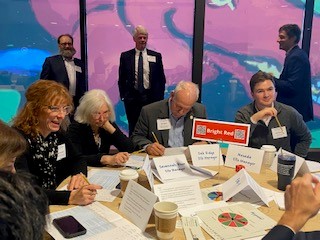
To improve understanding of the complexities associated with developing the annual budget for the Office of Environmental Management, and to foster state, local, and tribal participation in the process, participants will engage in a hands-on budget development exercise with a DOE EM facilitator. Following an overview of the exercise, participants will be randomly divided into 7 groups for the exercise.
OVERVIEW: The simulation will illustrate how the EM Program budget progresses from individual field site submittals to an enacted budget.
- Introduction: Basic budget overview, review terms to be used, and how the simulation exercise will run/instructions
- Simulation: Three-part exercise to involve Secretarial, OMB and Congressional guidance resulting with a final budget, which meets the established requirements
- Conclusion: Summary with facilitated discussion on what was experienced (challenges/expectations, etc.)
- Speaker: Steve Trischman, Director of Budget and Planning, Office of Environmental Management, U.S. Department of Energy
- Participants: All Meeting Attendees are Encouraged to Participate
AN AUDIENCE BEST PRACTICES SHARING SESSION: ENHANCING UNDERSTANDING OF THE BUDGET PROCESS AND ALIGNING SITE BUDGETS WITH COMPLIANCE MILESTONES
Audience members are highly encouraged to share insights on the budget simulation exercise and share best practices to facilitate collaborative transparency and mutual understanding of the budget process, setting overall cleanup priorities among DOE EM sites, adhering to legal agreements, building trust and good working relationships, etc.
Speakers: Meeting Attendees
Moderators:
- Chris Andres, Bureau of Federal Facilities Chief, Nevada Division of Environmental Protection
- Brian Begley, Paducah Site Section Supervisor, Kentucky Department for Environmental Protection
Thursday, December 1, 2022
COMBATTING CLIMATE CHANGE: ACCELERATING CLEAN ENERGY TECHNOLOGY FROM LAB TO MARKET – FROM CLEANUP TO CLEAN ENERGY
The Department of Energy’s Office of Clean Energy Demonstrations (OCED) is investing over $20 billion from the Bipartisan Infrastructure Law to support clean energy demonstration projects to help the country achieve net zero emissions by 2050. OCED Director of project management, formerly with DOE-EM, will discuss how clean energy projects may impact or benefit from EM cleanup sites, and how they will accelerate deployment, market adoption, and an equitable transition to a decarbonized energy system.
Speaker: Todd Shrader, Director, Project Management of the Office of Clean Energy Demonstrations, U.S. Department of Energy (Presentation Slides)
Moderator: Bevin Buchheister, Senior Policy Analyst, National Governors Association Center for Best Practices
DOE-EM CLIMATE ADAPTATION & RESILIENCY PLANNING
DOE is implementing new programs and requirements to address climate and resiliency issues and integrate them into the Departmental (including EM) missions. These programs can have long-term impacts on the environment and ongoing operations. This session will highlight climate, clean energy and resiliency initiatives.
Speakers:
- Lt. Governor Raymond Martinez, Pueblo de San Ildefonso
- Brian Vance, Hanford Site Manager
- Charlotte Bowers-Cunningham, County Commissioner, Roane County, Tennessee
Moderator: Paul Bembia, Director, West Valley Site Management Program, New York State Energy Research and Development Authority
PLANNING FOR THE FUTURE WORKFORCE
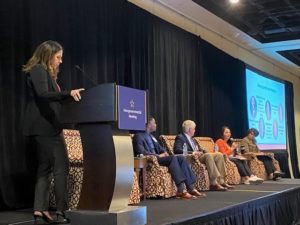
The cleanup of the nuclear weapons complex requires technically skilled and well-trained workers. Faced with an aging workforce and looming retirements, DOE-EM leadership, tribes and local communities are working to ensure that a new generation is ready to carry forward the cleanup mission. Through proactive programs aimed at local communities and enhanced support for student engagement in science, technology, engineering and math (STEM) and other mission enabling skills, these and other initiatives lay the groundwork for DOE-EM to continue safely remediating land and handling waste and cleanup at sites across the complex.
Speakers:
- Dameone Ferguson, Supervisory Diversity Manager, Workforce Development Team, Office of Environmental Management, U.S. Department of Energy
- Michael D. Budney, Manager, Savannah River Operations Office
- Rebecca Casper, Mayor, City of Idaho Falls, Idaho
- Faith Rosetta, Superintendent, Santa Fe Indian School
Moderator: Debbie Duren, Natural Resource Trustee Program Manager, Tenn. Department of Environment & Conservation
COORDINATED FEDERAL ACTIONS TO ADDRESS EMERGING CONTAMINANTS AT ENVIRONMENTAL MANAGEMENT SITES
Per- and poly-fluoroalkyl substances (PFAS) are a group of human-made chemicals that have been found in consumer products as well as manufacturing and processing facilities, airports, and military installations. DOE has been working to determine the potential historical and current use of PFAS at its sites. This session will include an overview of the DOE PFAS Program and the steps DOE is taking to address PFAS and coordinate with the Environmental Protection Agency and the Department of Defense.
Discussion Lead: Rob Seifert, Acting Director, Office of Infrastructure Management and Disposition Policy, Office of Environmental Management, U.S Department of Energy (Presentation Slides)
Speakers:
- Alexandria Long, Director for Compliance and Cleanup, Environment and Energy Resilience, Office of the Deputy Assistant Secretary of Defense, U.S. Department of Defense (Presentation Slides)
- Greg Gervais, Director, Federal Facilities Restoration and Reuse Office, U.S. Environmental Protection Agency (Presentation Slides)
INTERGOVERNMENTAL GROUPS—TAKEAWAYS AND NEXT STEPS
Participants will engage in a discussion reflecting highlights and key takeaways from the meeting, lessons learned, and future plans.
Moderator: Bevin Buchheister, NGA Center

